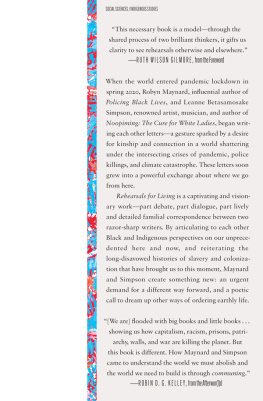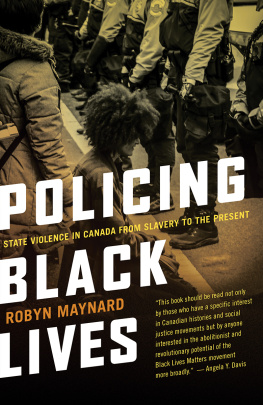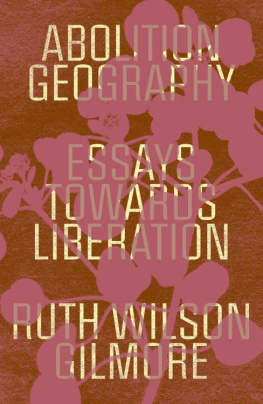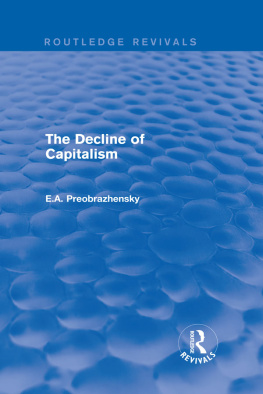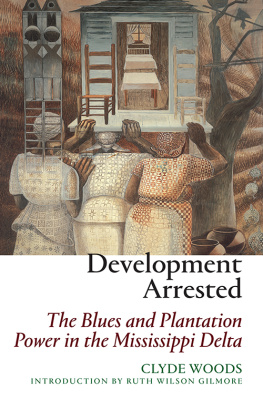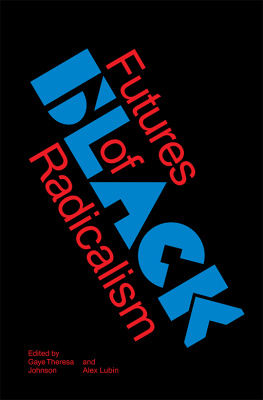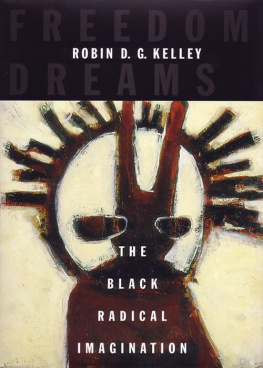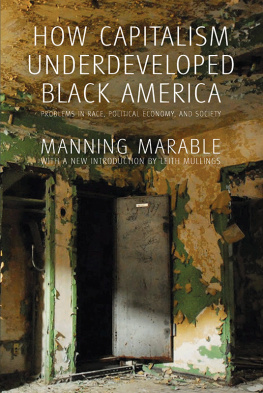Contents
Landmarks

PRAISE FOR
REHEARSALS FOR LIVING
Lyrical, visionary, and transcendent While chronicling the continuing unfolding calamities of settler colonialism and racial capitalism with care and razor-sharp clarity, Simpson and Maynard point readers to portals for different futures through the infinite possibilities of Black-Indigenous resistance.
Andrea J. Ritchie, author of Invisible No More: Police Violence Against Black Women and Women of Color
Simpson and Maynard draw out a political vision that emerges from epistolary connectionsletters, animated by stories, that seek out, engage, imagine, and narrate different kinds and types of liberation. Accentuated by entangled Black-Indigenous histories and geographies, Rehearsals for Living actualizes friendship as correspondence, modeling a mode of togetherness that we can practice, learn from, and revise.
Katherine McKittrick, author of Demonic Grounds and Dear Science and Other Stories
A profound and sublime work of memory, witnessing, refusal, dreaming. In the trenchant tradition of Black and Indigenous feminisms, this brilliant book moves us away from the language of crisis or victimhood to the precise and intimate encounters of kinship and liberation. The letters between Maynard and Simpson magnificently shapeshift and engage on multiple levels, and in doing so, rigorously demand an accounting for horrific violences while illuminating lives and worlds anew. A masterclass in literary form, ethical orientations, and collective futures.
Harsha Walia, author of Border and Rule: Global Migration, Capitalism, and the Rise of Racist Nationalism
The beautifully named Rehearsals for Living is a gift conjured by a pair of brilliant scholars during the dark days and months of the pandemic, lit by a powerful resistance movement, fueled and rendered magical by a profound and challenging dialogue that offers ways to collectively think and be and act in a chaotic world.
Roxanne Dunbar-Ortiz, author of An Indigenous Peoples History of the United States
Rehearsals for Living is an intellectually fierce dialogue about our colonial present In a time of incredible uncertainty, Simpson and Maynard show that the shared and divergent histories of Black and Indigenous communities are foundational to the building of a better world for all.
Glen Coulthard, author of Red Skin, White Masks: Rejecting the Colonial Politics of Recognition
The end of the world, or the end of capitalism, colonialism, heteropatriarchy, white supremacy? This astonishing work of literature and theory enables us to imagine the end of them all, and to call into being, to rehearse, a world anew.
John Munro, author of The Anticolonial Front: The African American Freedom Struggle and Global Decolonization, 19451960
Captures that urgent project of what it means to be human and imagine freedom in times of terrible danger. Maynard and Simpson tap into Black and Indigenous ways of knowing and world-making that require a fundamental disordering of the forces of destruction and the re-ordering of life and the beautiful struggle to get free.
Nick Estes, author of Our History Is the Future: Standing Rock Versus the Dakota Access Pipeline, and the Long Tradition of Indigenous Resistance
Using the age-old practice of letter-writing and the land itself as a palimpsest, Robyn Maynard and Leanne Betasamosake Simpson find common ground to challenge the moral legitimacy of the settler nation state, and reinscribe new ways of what it means to be beings who are human in the forensic landscapes of Canada Rehearsals for Living is fundamental to understanding the interlocking, founding crimes of the Americas; necessary for remembering the many erased histories of the ongoing struggle for justice; and altogether indispensable to those wanting to create possible solutions.
M. NourbeSe Philip, author of Zong!
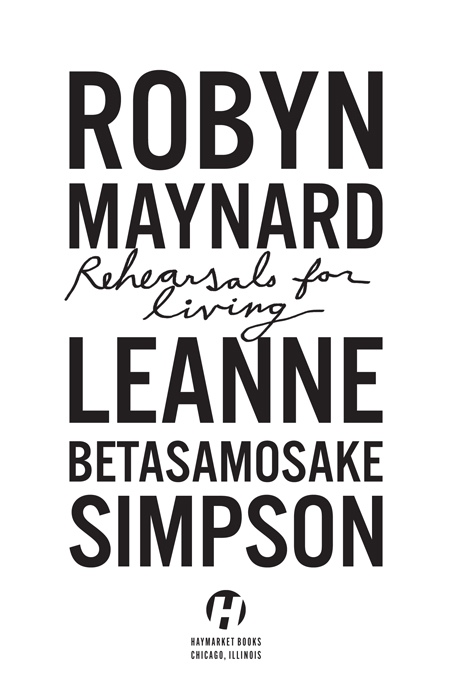
Copyright 2022 Robyn Maynard and Leanne Betasamosake Simpson
Published simultaneously in Canada by Knopf Canada / Penguin Random House Canada
Published in 2022 by
Haymarket Books
P.O. Box 180165
Chicago, IL 60618
773-583-7884
www.haymarketbooks.org
ISBN: 978-1-64259-715-8
ISBN EPUB: 978-1-64259-715-8
Distributed to the trade in the US through Consortium Book Sales and Distribution (www.cbsd.com) and internationally through Ingram Publisher Services International (www.ingramcontent.com).
This book was published with the generous support of Lannan Foundation and Wallace Action Fund.
Special discounts are available for bulk purchases by organizations and institutions. Please email for more information.
Cover artwork courtesy of Howardena Pindell and Garth Greenan Gallery, New York.
Cover and text design by Kate Sinclair.
Library of Congress Cataloging-in-Publication data is available.

To Lamar, Minowewebeneshiinh and Nishna.
THE ABOLITIONIST PAPERS SERIES
Edited by Naomi Murakawa
Also in this series:
Change Everything:
Racial Capitalism and the Case for Abolition
Ruth Wilson Gilmore
Abolition. Feminism. Now.
Angela Y. Davis, Gina Dent,
Erica R. Meiners, and Beth E. Richie
We Do This Til We Free Us:
Abolitionist Organizing and Transforming Justice
Mariame Kaba
FOREWORD

Ruth Wilson Gilmore
Spectacles
Robyn Maynard and Leanne Betasamosake Simpsons beautiful book helped me see something I had not quite seen before. For some years now Ive offered a lecture called Meanwhile: Making Abolition Geographies. The lectures basic principle goes something like this: abolition is life in rehearsal because freedom is a place. Sometimes the lecture stretches out into several talks, and other times its a one off. The content changes but the structure is consistent. On most occasions Ill invoke issues specific to where my hosts are located to help listeners see what Im talking about with some immediacy. So, lectures have referenced the Chicago Teachers Strike, Brazils Landless Workers Movement (MST), solidarity with South African self-built communities, Water Protectors at Standing Rock, nurses unions building a global movement hospital-by-hospital and country-by-country, and so on.
Although most of the content in Meanwhile is about relatively recent occurrences, it is a historical geography of the future. In other words, the purpose isnt to document that a specific thing happened, but rather to offer thickly analytical, detailed descriptions of many different ways people arrive at arranging themselves into a social force whether in California, or Portugal, or the Black Atlantic, or North America, or South Asia. The social-spatial fights, connecting past to present, are waged by farmworkers or public sector unions, environmental justice activists or schoolchildren, long distance migrants, care workers, households and communities, transport workers, people in prison, detention, and jail, students, sex workers, formerly and currently incarcerated people and their loved ones, Indigenous peoples fighting for true decolonization, and people who claim space by occupying land in urban and rural areas of the global south (wherever in the world that may be). Any of those places, and more, can figure in the historical geographies of the future, by making abolition geographies as we go.

